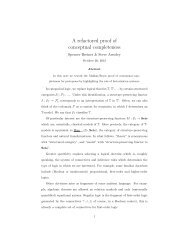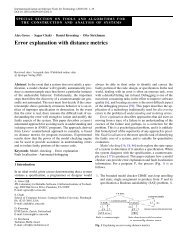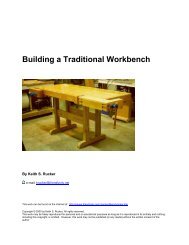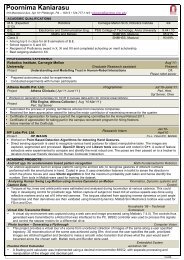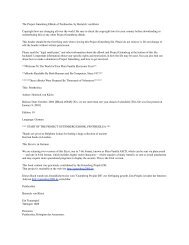Lim 1 Wei Shan, Lim (Terence) - CMU Contributed Webserver
Lim 1 Wei Shan, Lim (Terence) - CMU Contributed Webserver
Lim 1 Wei Shan, Lim (Terence) - CMU Contributed Webserver
Create successful ePaper yourself
Turn your PDF publications into a flip-book with our unique Google optimized e-Paper software.
<strong>Wei</strong> <strong>Shan</strong>, <strong>Lim</strong> (<strong>Terence</strong>)<br />
Ms. Patricia Rich<br />
76-‐101 Contribution paper<br />
6 December 2010<br />
Abstract<br />
There are many reasons and benefits that make it appropriate for us to go<br />
vegetarian. This begs the question: which reason is the most appropriate?”<br />
Authors in the moralists, environmentalists and naturalists camp have<br />
argued respectively that moral, environmental and health reasons make it<br />
most appropriate for us to do so. However, one aspect has been largely<br />
overlooked in their argument, and that is safety. Eating meat may be unsafe<br />
because it can cause food borne illnesses, which could eventually lead to<br />
death. Thus, through this paper, the focus will be on why food safety is an<br />
important issue that makes it very appropriate for us to go vegetarian, and it<br />
ought not be left out in the conversation. Through the use of models laid out<br />
by scholars in the field of food safety and case studies, the potential dangers<br />
of eating meat will be highlighted, hence making it more persuasive for<br />
people to understand the unsafe nature of eating meat and eventually<br />
abstain from it.<br />
<strong>Lim</strong> 1
Our safety is also at stake<br />
<strong>Lim</strong> 2<br />
On the night of 31 July 2001, Kevin Kowalcyk, a two-‐year-‐old boy awoke with<br />
diarrhea and a mild fever. Within 2 days, his condition worsened, as he suffered<br />
from serious dehydration and bloody stools, and was subsequently hospitalized. His<br />
kidneys started failing later that afternoon as he developed Hemolytic Uremic<br />
Syndrome (HUS). By the end of that week, his blood pressure and heart rate<br />
required numerous medications to be stabilized. In the evening of 11 August, his<br />
helpless parents and doctors could do nothing but only witness his death as he<br />
slipped away at the mercy of the bacteria in his body (cspinet.org). All these<br />
downturn of events led by the bacteria occurred merely within days. Subsequent<br />
investigations subsequently proved that Kevin suffered from food borne illness<br />
caused by the bacteria, Escherichia coli, or E. coli for short, that came from a<br />
hamburger, which eventually led to his death (Food, Inc., DVD). Similar to Kevin,<br />
thousands of others in America have suffered the same fate after consuming meat.<br />
Despite having such a significant and detrimental impact in our lives, safety reasons<br />
have been neglected when it comes to the discussion of the most appropriate<br />
reasons for us to go vegetarian. Instead, authors in the moralists, environmentalists<br />
and naturalists camp have argued respectively that moral, environmental and health<br />
reasons make it most appropriate for us to do so, without mentioning about the<br />
unsafe nature of consuming meat. In fact, food safety is very important, and it ought<br />
not be left out of the conversation. This is done through examining why it is unsafe<br />
to eat meat due to the potential of contracting food borne illness, and the dangerous
<strong>Lim</strong> 3<br />
consequences of food borne illness on our wellbeing. Before explaining why this is<br />
so, we would first examine the other authors’ point of view.<br />
From the other authors’ point of view<br />
The naturalists claimed that health reasons make it most appropriate for us<br />
to go vegetarian. For example, Freeman highlights the numerous health degradation<br />
effects of consuming meat in his article “Having It His Way”. She cautions us that<br />
eating too much meat and too little vegetables increases the “risk of contracting<br />
diseases like cancer, heart disease, and diabetics” (Freeman 280). She also argues<br />
that meat produces lack “fiber” (Freeman 280), yet comprise of “cholesterol and<br />
saturated fat” (Freeman 280). Likewise, Michael Pollan argues in his article<br />
“Unhappy Meals” that we should “eat mostly plants, especially leaves” (Pollan,<br />
Unhappy Meals, 14) due to health concerns. This is because eating meat is<br />
detrimental to our health. The naturalists have therefore emphasized their stand<br />
that health reasons make it most appropriate for us to abstain from meat. However,<br />
they did not mention that safety reasons are also imperative, which can help to<br />
strengthen their argument to a great extent, as I will elaborate on later in the paper.<br />
The moralists, on the other hand, argue that morality is the most appropriate<br />
reason for us to abstain from meat. An example of a moralist is Michael Pollan, a<br />
food activist, who believes in going vegetarian not only for health reasons, but also<br />
for moral reasons. Pollan mentioned in his article “An Animal’s Place”, that the<br />
operations in a factory farming is cruel to animals, causing them pain and suffering.<br />
For instance, animals were placed in “battery-‐cages -‐ stacked wired cages so small
(that) the birds cannot stretch their wings” (Pollan, An Animal’s Place, 1) with “a<br />
<strong>Lim</strong> 4<br />
half-‐dozen other hens” (Pollan, An Animal’s Place, 5). Also, he brought up the point<br />
that “Beef cattle…(are) standing ankle deep in their own waste eating a diet that<br />
makes them sick” (Pollan, An Animal’s Place, 11). Due to such unhygienic and<br />
uncomfortable conditions that can also cause physiological stress, many animals fell<br />
sick and died. Pollan has explained that the practices used to treat these animals are<br />
cruel and immoral using the above examples. The moralists have thus argued their<br />
stand that moral reasons make it most appropriate for us to abstain from meat.<br />
Likewise, they did not mention that safety reasons are also very important, which<br />
can also help to strengthen their argument if they had done so.<br />
The environmentalists, however, strongly believe that environmental<br />
reasons are more important for us to abstain from meat. According to Devra<br />
Gartenstein in his book, The Accidental Vegan, “A United Nations report early in<br />
2007 fingered livestock as the single largest source of greenhouse gases,<br />
contributing more toward global warming than even transportation” (Gartenstein<br />
Preface). This means that Gartenstein, who represents the environmentalist group,<br />
is emphasizing that we are contributing a lot to degradation of the environment by<br />
eating meat, and thus making it appropriate for us to go vegetarian so as to protect<br />
our environment. In fact, he supports this with the statement, “Every meal that<br />
doesn’t include meat lessens … the toll it takes on our planet” (Gartenstein Preface<br />
vi). This is because livestock releases a great amount of methane gas, and thus<br />
contributing to the greenhouse effect and global warming. The environmentalists<br />
have thus argued their stand that environmental reasons make it most appropriate
<strong>Lim</strong> 5<br />
for us to abstain from meat. Similarly, the environmentalists also did not mention<br />
that safety reasons are substantial, which can support their argument.<br />
So, why is it unsafe to eat meat?<br />
Now that we have examined what the other authors have discussed, we shall<br />
now analyze the reasons why eating meat is unsafe, and thus should not have been<br />
left out from their conversation. According to the journal, “E. Coli Exposed!” by W.<br />
Conard Holton, “A primary source of E. coli 0157:H7 is the gastrointestinal tract of<br />
cattle (Holton, A588)”. Holton then went on to explain that, “as few as 10 E. coli<br />
0157: H7 bacteria can cause (food borne) illness” (Holton, A588). Hence, this shows<br />
that the E. coli 0157: H7 bacteria from cattle are so deadly that just a few strains of it<br />
can impair us greatly and cause illness. In other words, eating the meat of cattle<br />
greatly increases the chance of us contracting food borne illnesses due to the E. coli<br />
bacteria. If this still does not sound frightening enough, Holton also emphasizes that<br />
outbreak of E-‐coli and its related food borne illnesses is not contained within a<br />
country or state. Rather, “Outbreaks of E. coli 0157: H7-‐related diseases have been<br />
recorded worldwide” (Holton, A588). According to statistics, “The CDC estimates<br />
that the overall number of people sickened in the United States each year by E. coli<br />
0157: H7 is approximately 73,000” (Holton, A588). From these facts and figures, this<br />
shows that E. Coli originates from cattle, and not only does it cause food borne<br />
illness should we consume meat, it is also a widespread problem, and hence could<br />
potentially affect anyone who consumes meat.
<strong>Lim</strong> 6<br />
Similarly, according to the medical journal “0157 Kills Five People In Scotland”<br />
by British Medical Journal (BMJ) Publishing Group, E. coli is one of the causes of food<br />
borne illnesses. This is evident from the fact that those victims who died had eaten<br />
“cold and cooked meat products sold by a butcher, John Barr and Son”. It was later<br />
traced back that they had “eaten a steak pie supplied by John Barr, and tests have<br />
since confirmed the presence of harmful E. coli bacteria in the gravy” (0157 Kills<br />
Five People In Scotland, 2). So how does this prove that eating meat is unsafe? As a<br />
matter of fact, E. coli is a bacterium that is present in the intestines of many animals.<br />
Moreover, as also stated in the journal, “cattle are the principal source of the<br />
organism” (0157 Kills Five People In Scotland, 2). In other words, this shows that<br />
the bacteria, E. coli, which cause food borne illnesses, originate from cattle, and<br />
hence there is a very high chance of infection if we consume meat. Likewise,<br />
according to Cheleste M. Thorpe in her article “Shiga-‐Toxin – Producing Escherichia<br />
coli Infection”, “the number of outbreaks linked to consumption of ground beef has<br />
increased” (Thorpe, 2). This proves my above arguments that eating meat causes<br />
food borne illness, due to bacteria such as E. coli that originates from cattle.<br />
Also, according to the documentary, Food Inc., factory farming is used in<br />
industrial farming by agribusiness, such as Monsanto, Perdue, Tycon and Smithfield.<br />
In factory farming, a large concentration of animals is placed in a very small space.<br />
In the documentary, Maryland chicken farmer Carole Morison expressed her<br />
revulsion towards her company’s farming practices. As such, she took the risk of a<br />
potential retaliation from the food companies as she presented to us the conditions<br />
in a typical chicken farm, where thousands of chickens are enclosed and crowded
together in dark, warm, dusty and small sheds. Within the sheds, the chickens<br />
<strong>Lim</strong> 7<br />
struggled for space, food, and water, and also lived among their droppings, which<br />
contained many bacteria, such as E. coli. As a result, diseases and bacteria were<br />
rampant among the chickens (Food, Inc., DVD). And in such intensive farming,<br />
conditions are optimum for bacteria to mutate and transmit. At the end of the food<br />
chain, we contract food borne illnesses should we consume these sickened or<br />
diseased poultry. More dangerously, bacteria such as E. coli can survive in an<br />
environment with or without air, and hence can be transmitted to others easily,<br />
causing widespread infection (Food, Inc., DVD). Hence, from the above reasons,<br />
eating meat (especially those from factory farming due to its intense nature) can<br />
potentially cause us to be infected with food borne illness that can be fatal, and<br />
potentially spread to other people easily to cause an epidemic. This is because<br />
bacteria such as E. coli, which originates from cattle, cause food borne illness.<br />
Dangers and consequences of food borne illnesses and E. coli<br />
Now that we have analyzed that eating meat is unsafe as it can cause food<br />
borne illnesses due to E. coli, let us now examine the its significance and dangers.<br />
According to the journal, “E. Coli Exposed!” by W. Conard Holton, “the (E. coli)<br />
bacterium produces toxins that result in abdominal cramps, vomiting, often bloody<br />
diarrhea, and sometimes fever” (Holton, A588). Indeed, some of the symptoms of<br />
food borne illness may sound mild. However, “in some acute cases, the infection will<br />
develop into hemolytic uremic syndrome (HUS), which is characterized by the<br />
destruction of red blood cells, kidney failure, and potentially seizures, stroke, and
<strong>Lim</strong> 8<br />
death” (Holton, A588). In fact, once infected by HUS, “all doctors can do is to try to<br />
keep the child’s body alive while the disease runs its course” (cspinet.org). Similarly,<br />
Thorpe explained, “10% of those who develop HUS (due to E. coli) will die or have<br />
permanent renal failure, and up to 50% of those who develop HUS will develop<br />
some degree of renal impairment (Thorpe, 2). With the above mentioned, we can<br />
see that food borne diseases are very deadly, and there is no cure for it. Like in<br />
Kevin’s case, doctors could do nothing to stop the rampage of the disease. Also,<br />
children and the elderly who have weaker immune system are more susceptible to<br />
these bacteria such as E. coli. Once infected, the fates of these individuals lie in the<br />
hands of the bacteria, hence making it very dangerous.<br />
As much as it may sound impossible that eating meat can cause death, it is in<br />
fact very real and can occur to any of us, and this can be proven with a few case<br />
studies. As mentioned earlier in this paper, Kevin died after 12 days from E. coli<br />
0157:H7 poisoning and Hemolytic-‐uremic syndrome (HUS) after consuming a<br />
hamburger. This led his mother, Barbara Kowalcyk, to subsequently investigate the<br />
truth behind the profit-‐oriented food industry, of which she discovered that the<br />
focus of these industries was on efficiency and profit rather than safety, hence<br />
leading to the cause of E. coli. She is now a food safety advocate, and aims to help the<br />
government stop these industries’ complacent practices and shut down those who<br />
do not comply with safety standards for food handling.<br />
Also, it was reported that “E. coli 0157:H7 achieved notoriety in 1993, when<br />
undercooked contaminated hamburger from the Jack In The Box restaurant chain<br />
caused over 700 people, primarily children, to become ill and 4 people to die”
<strong>Lim</strong> 9<br />
(Holton, 2). Besides all these cases of reported deaths as mentioned above, there are<br />
also many incidences of people dying due to consuming meat contaminated with<br />
bacteria all over the world. Another example would be the two deaths that have<br />
been reported that are associated with Beef from Fairbank Farms in November<br />
2009 (cdc.gov). From these examples above, it is evident that eating meat is unsafe<br />
because it can cause food borne illness if contaminated with bacteria E. coli<br />
Putting the conversation together<br />
While the naturalists have provided strong evidences above to show that<br />
eating meat may be detrimental to our health, they overlooked the fact that eating<br />
meat can also be unsafe, even to the point that it can cause food borne illnesses<br />
which can eventually lead to death. As explained above, food borne illnesses<br />
originates from cattle, and can cause detrimental damage to our wellbeing. Since<br />
health and safety are closely related to our well-‐being, and that our health and<br />
safety can be compromised from eating meat, the naturalists will generally agree<br />
with my argument, that safety reasons ought to be mentioned to strengthen their<br />
argument. This is because eating meat is not only detrimental to our health, it can<br />
also cause food borne illnesses and even death in more serious scenarios.<br />
Similarly, the moralists have strongly argued their stand that morality makes<br />
it most appropriate to abstain from meant, they have overlooked the fact that eating<br />
meat can also be unsafe. The moralists have explained clearly the harsh and<br />
unhygienic conditions of how these animals are raised and slaughtered, and hence it<br />
is cruel and immoral to eat meat. However, they can increase their persuasiveness
to convince people against eating meat if they had also mentioned that the<br />
unhygienic conditions makes it unsafe for us to eat meat. This is because, like as<br />
farmer Carole Morison presented the conditions in a typical chicken farm earlier,<br />
the unhygienic conditions promotes the spread of diseases that cause food borne<br />
illness, which can be harmful to us should we consume such animals that are not<br />
properly handled. Moreover, according to “Stephanie Maxine Ross” in her article<br />
“Foodborne Illness and Factory Farming”, “stress hormones can increase (the)…<br />
systematic spread of infection in chickens” (Ross, 171). Hence, the moralists can<br />
argue likewise that the stressful and unhygienic conditions these animals are<br />
<strong>Lim</strong> 10<br />
subjected to also causes the spread of diseases, besides the fact that it is cruel, hence<br />
making their argument more persuasive. Nonetheless, since morality and safety are<br />
similar in terms of the conditions of how these animals are raised, the moralists will<br />
not disagree with my argument that safety reasons are also very important reasons<br />
for us to abstain from meat, and should not have been left out of their conversation.<br />
On the other hand, just like what the environmentalists believe, as we raise<br />
cattle in a farm or factory, we also contribute to environmental degradation as the<br />
wastes from the farms and factories are drained into the ground or into rivers,<br />
hence “tainting the water” (Holton, A588). In fact, this not only causes harm to the<br />
environment, it can also cause a potential harm to our health, hence making it<br />
unsafe. This is because most of the waste from raising cattle (due to our demand for<br />
meat) contains bacteria that cause food borne illness, and these bacteria when<br />
leaked into the ground or rivers, contaminate crops and fishes respectively.<br />
Moreover, there are also many other food items that have been contaminated when
it “came in contact with (cattle’s) manure” (Holton, A588). As such, we are<br />
<strong>Lim</strong> 11<br />
potentially at risk of food borne illnesses should we consume these contaminated<br />
crops or fishes. As the environmentalists argued strongly that environmental<br />
reasons make it most appropriate for us to abstain from meat, they failed to mention<br />
safety reasons, which is also an important aspect that should not be left out of the<br />
conversation. By arguing that eating meat is not only detrimental to environment, as<br />
well as a potential safety breach to our health, the environmentalists can make a<br />
more persuasive argument.<br />
From the critics’ point of view<br />
Some critics may argue that going vegetarian may not necessarily be safe,<br />
because there have also been many food borne outbreaks with vegetable and non-‐<br />
meat products, most notable and recently tomatoes, spinach, and peanut butter.<br />
While this is true, we need to examine the cause of how bacteria end up in these<br />
food products. Tracing back these outbreaks, it was later revealed that the bacteria<br />
originated from animals, whereby it was exposed to animal fecal material (Holton,<br />
A588). Some of these bacteria spread to other sources of food, because they are<br />
leaked into rivers, due to mishandling of factory waste materials. On the other hand,<br />
going vegetarian reduces the demand for animals, and hence reduces the number of<br />
animals raised in factories and the chance of the spread of food borne illness-‐<br />
causing bacteria.<br />
Also, some critics may argue that fully cooking meat before consumption will<br />
be safe. This is however a misconception, and is not necessarily true according to a
conversation, it can make their argument even more persuasive. This is because<br />
<strong>Lim</strong> 13<br />
many of our assumptions, such as the way factory farming today handles animals,<br />
are similar. Also, there are issues that we agree on and value for; one of such is our<br />
overall well-‐being. Nevertheless, we all share the same value that there are many<br />
benefits of going vegetarian, and we hope that with our reasons, we can persuade<br />
more people to do so, and enjoy the benefits from it.
Works Cited<br />
<strong>Lim</strong> 14<br />
“0157 Kills Five People In Scotland” BMJ: British Medical Journal, Vol. 313, No. 7070<br />
(Dec. 7, 1996), p. 1424. Print.<br />
“CDC E. Coli”. cdc.gov. Web. 25 November 2010.<br />
“Center for Science in the Public Interest.” cspinet.org. Web. 25 November 2010.<br />
Cheleste M. Thorpe. “Shiga Toxin-‐Producing Escherichia coli Infection.” Clinical<br />
Infectious Diseases, Vol. 38, No. 9 (May 1, 2004), pp. 1298-‐1303. Print.<br />
Food, Inc. Dir. Robert Kenner. Magnolia Pictures, 4 June 2009. DVD.<br />
Freeman, P. Carrie, and Merskin, Debra. “Having It His Way: The Construction of<br />
Masculinity in Fast-‐Food TV Advertising.” Food For Thought: Essays on<br />
Eating and Culture. Ed. Lawrence C. Rubin. Jefferson, NC: McFarland, 2008.<br />
277-‐91.<br />
Gartenstein, Devra. The Accidental Vegan. Berkeley and Toronto: Celestial Arts,<br />
2009. Print.<br />
Pollan, Michael. “Unhappy Meals.” The New York Times 28 January 2007. Print.<br />
Pollan, Michael. “An Animal’s Place.” The New York Times 10 November 2002. Print.<br />
Richard L. Vogt and Laura Dippold. “Escherichia coli O157:H7 Outbreak Associated<br />
with Consumption of Ground Beef.” Public Health Reports (1974-‐), Vol. 120,<br />
No. 2 (Mar. -‐ Apr., 2005), pp. 174-‐178. Print<br />
Stephanie Maxine Ross, “Food for Thought, Part I: Foodborne Illness and Factory<br />
Farming”. 2006. Print.<br />
W. Conard Holton. “E. coli Exposed!” Environmental Health Perspectives, Vol. 110,<br />
No. 10 (Oct., 2002), pp. A586-‐A589. Brogan & Partners. Print



